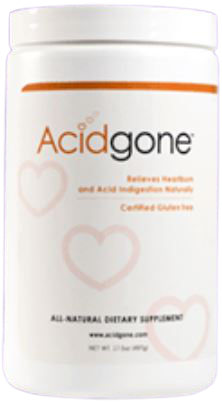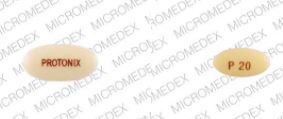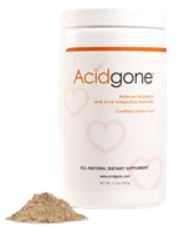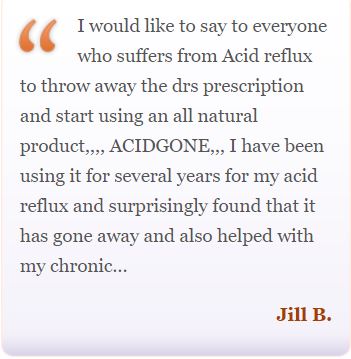Acidgone® - Natural Alternative for Protonix,
What is Protonix (pantoprazole)?
Protonix (pantoprazole) is a proton pump inhibitor that decreases the amount of acid produced in the stomach.
Protonix is used to treat erosive esophagitis (damage to the esophagus from stomach acid), and other conditions involving excess stomach acid such as Zollinger-Ellison syndrome.
Protonix is not for immediate relief of heartburn symptoms.
Protonix Side Effects
Applies to all Protonix dosage forms.Pantoprazole (the active ingredient contained in Protonix) may cause unwanted side effects that require medical attention.
Side effects requiring immediate medical attention
Along with its needed effects, pantoprazole (the active ingredient contained in Protonix) may cause some unwanted effects. Although not all of these side effects may occur, if they do occur they may need medical attention.
Check with your doctor immediately if any of the following side effects occur while taking pantoprazole:
Less common
- Blurred vision
- dry mouth
- flushed, dry skin
- fruit-like breath odor
- increased hunger
- increased thirst
- increased urination
- nausea
- stomach pain
- sweating
- trouble breathing
- unexplained weight loss
- vomiting
Incidence not known
- Absence of or decrease in body movements
- blindness
- blistering, peeling, or loosening of the skin
- bloating
- bloody or cloudy urine
- bloody, black, or tarry stools
- blurred vision
- chills
- clay-colored stools
- constipation
- continuous ringing or buzzing or other unexplained noise in the ears
- cough
- dark urine
- decreased vision
- diarrhea
- difficulty with speaking
- difficulty with swallowing
- dizziness or lightheadedness
- drowsiness
- fast heartbeat
- feeling of constant movement of self or surroundings
- fever
- general feeling of tiredness or weakness
- greatly decreased frequency of urination or amount of urine
- headache
- hearing loss
- high fever
- hives, itching, or skin rash
- indigestion
- joint pain
- large, hive-like swelling on the face, eyelids, lips, tongue, throat, hands, legs, feet, or genitals
- light-colored stools
- loss of appetite
- mood or mental changes
- muscle cramp, pain, or stiffness
- muscle spasms (tetany) or twitching
- pains in the stomach, side, or abdomen, possibly radiating to the back
- pale skin
- puffiness or swelling of the eyelids or around the eyes, face, lips, or tongue
- red skin lesions, often with a purple center
- red, irritated eyes
- seizures
- sensation of spinning
- sore throat
- sores, ulcers, or white spots on the lips or in the mouth
- stomach pain, continuing
- swelling of the feet or lower legs
- swollen glands
- tightness in the chest
- trembling
- unexplained bleeding or bruising
- unpleasant breath odor
- unusual tiredness or weakness
- vomiting of blood
- yellow eyes or skin
Side effects not requiring immediate medical attention
Some side effects of pantoprazole may occur that usually do not need medical attention. These side effects may go away during treatment as your body adjusts to the medicine. Also, your health care professional may be able to tell you about ways to prevent or reduce some of these side effects.
Check with your health care professional if any of the following side effects continue or are bothersome or if you have any questions about them:
Less common
- Belching
- bloated or full feeling
- excess air or gas in the stomach or bowels
- passing gas
- trouble sleeping
Incidence not known
- Increased watering of the mouth
News for proton pump inhibitors
* Heartburn Drugs Again Tied to Fatal Risks
From the WebMD Archives By Amy Norton HealthDay Reporter
THURSDAY, June 6, 2019 (HealthDay News) — People who use common heartburn drugs for months to years may face heightened risks of dying from heart disease, kidney failure or stomach cancer, a new study suggests.
The study included more than 200,000 U.S. veterans. It’s the latest to raise concerns over drugs called proton pump inhibitors (PPIs). They include prescription and over-the-counter drugs like Prilosec (omeprazole), Prevacid (lansoprazole) and Nexium (esomeprazole). And they rank among the top-selling medications in the United States.
Research in recent years has linked prolonged PPI use to increased risks of various diseases and premature death.
These latest findings point to the specific causes of death tied to the drugs, said lead researcher Dr. Ziyad Al-Aly.
He stressed that the excess risks were relatively small. For example, over 10 years, 13% of PPI users died of a cardiovascular condition, including heart disease or stroke. That compared with just over 11% of people who used H2 blockers, another class of heartburn drug.
When the researchers weighed other factors — such as patients’ age and chronic health conditions — PPI use was tied to a roughly 18% higher risk of cardiovascular death.
However, based on patients’ medical records, many of those with PPI prescriptions had no documented need for one.
“That’s unsettling,” said Al-Aly, an assistant professor at Washington University School of Medicine in St. Louis.
“It suggests a lot of people were using a PPI without actually needing one,” he said. “They could be taking a risk without deriving any benefit.”
But an expert not involved in the study said it’s unclear whether PPIs, themselves, are responsible for the higher death rates.
Those types of studies cannot prove cause and effect, Kim said. There may be other explanations for the higher risks seen among PPI users.
In 2017, Kim said, the gastroenterological association published a review of the research into the issue.
*Clues to How Popular Heartburn Drug Might Harm Arteries
TUESDAY May 10, 2016 — A popular over-the-counter heartburn medication accelerated aging of blood vessel cells in lab tests, raising red flags about its long-term effect on heart health, researchers say.
Faster aging of blood vessel cells exposed to the
antacid Nexium(esomeprazole) might potentially hinder the tasks these cells perform to prevent heart attack and stroke, the new study suggests.
These lab results could explain why other studies have shown increased risk of heart disease in people who use proton pump inhibitors (PPIs) — the class of heartburn medication that includes Nexium, said study senior author Dr. John Cooke.
“Our finding that the lining of blood vessels is impaired by proton pump inhibitors is a unifying mechanism for the reports that PPI users are at increased risk for heart attack, stroke and renal failure,” said Cooke, chair of cardiovascular sciences at the Houston Methodist Research Institute.
However, many people aren’t using PPIs in accordance with FDA guidelines, which in Nexium’s case would limit them to a four-week course of treatment three times a year, Cooke said.
*1 in 4 Hospitalized Newborns Gets Heartburn Drugs, Despite Risks
WEDNESDAY April 27, 2016, 2016 — Despite reported risks, nearly one in four infants in neonatal intensive care units
(NICUs) are given stomach acid-suppressing drugs, researchers report.
A number of studies have linked the use of stomach acid-suppressing drugs in hospitalized high-risk infants with infections, necrotizing enterocolitis (a serious disease where intestinal tissue begins to die off) and increased risk of death, the researchers said.
These drugs include histamine-2 receptor antagonists such as ranitidine
(Zantac), and proton pump inhibitors such as esomeprazole(Nexium).
But, “there’s actually little evidence that acid suppression helps in the NICU at all,” Slaughter said in a hospital news release.
*Doctors Often Overestimate Promise of Newly Approved Drugs
TUESDAY April 12, 2016, 2016 — Use of the word “breakthrough” in the U.S. Food and Drug Administration expedited approval process could mislead doctors about the new drugs’ actual benefits, researchers warn.
The U.S. Congress in 2012 gave FDA the power to designate a drug as a “breakthrough
therapy” if preliminary clinical evidence suggests an advantage over existing medications.
But a survey of nearly 700 doctors revealed that many tended to misinterpret “breakthrough.” Doctors often believed the drugs were supported by stronger evidence than the law requires to achieve that designation, said lead author Dr. Aaron Kesselheim. He is a faculty
member at Brigham and Women’s Hospital in Boston.
“When people hear ‘breakthrough,’ it gives them an inappropriately elevated sense of what the drug might do,” Kesselheim said. “It may give physicians false reassurance about the outcomes they might expect to receive when they prescribe it.”
In the survey, nine out of 10 doctors chose one hypothetical drug over another identical one solely based on the “breakthrough” designation, even though both were taken on the same schedule, had similar side effects, and were equally covered by the patient’s insurance.
In addition, 52 percent incorrectly believed that strong evidence from randomized trials is needed to earn the breakthrough designation, the researchers found.
“They thought when a drug is labeled as a breakthrough therapy it actually is a breakthrough, and that’s not necessarily the case,” Kesselheim said. “Many drugs labeled as breakthrough therapies are not true
breakthroughs, because they don’t provide substantially advanced treatment over what’s already available.”
The results were published April 12 in the Journal of the American Medical Association.
Brawley also said he is “convinced there are still some doctors who still tend to think the new drugs are better than the old drugs.”
He noted the case of Prilosec, a heartburn medication made by AstraZeneca. When it came time for Prilosec to go generic, AstraZeneca marketed a new heartburn drug called Nexiumfor which it could still charge premium prices.
“They never said that Nexium simply contained the same active ingredient as their old drug Prilosec,” Brawley said. “If you’ll recall, Nexium became one of the best-selling drugs for years. There are people who are surely prescribing it because it is newer.”
For more on “breakthrough” therapies, visit:
U.S. Food and Drug Administration.
- FDA Alert: Proton Pump Inhibitors (PPIs) – Drug Safety Communication: Clostridium Difficile-Associated Diarrhea (CDAD) Can be Associated With Stomach Acid Drugs, February 8, 2012
- AcipHex (rabeprazole sodium)
- Dexilant (dexlansoprazole)
- Nexium(esomeprazole magnesium)
- Omeprazole (omeprazole) Over-the-Counter (OTC)
- Prevacid (lansoprazole) and OTC Prevacid 24hr
- Prilosec (omeprazole) and OTC
- Protonix (pantoprazole sodium)
- Vimovo (esomeprazole magnesium and naproxen)
- Zegerid (omeprazole and Sodium bicarbonate) and OTC
ISSUE:
FDA notified the public that the use of stomach acid drugs known as proton pump inhibitors (PPIs) may be associated with an increased risk of Clostridium difficile–associated diarrhea (CDAD). A diagnosis of CDAD should be considered for patients taking PPIs who develop diarrhea that does not improve. The FDA is working with manufacturers to include information about the increased risk of CDAD with use of PPIs in the drug labels.
FDA is also reviewing the risk of CDAD in users of histamine H2 receptor blockers. H2 receptor blockers are used to treat conditions such as gastroesophageal reflux disease (GERD), stomach and small intestine ulcers, and heartburn.
BACKGROUND: Proton pump inhibitors (PPIs) are marketed under various brand and generic drug names as prescription and over-the-counter (OTC) products. They work by reducing the amount of acid in the stomach. Prescription PPIs are used to treat conditions such as gastroesophageal reflux disease (GERD), stomach and small intestine ulcers, and inflammation of the esophagus. Over-the-counter PPIs are
used to treat frequent heartburn.
Clostridium difficile (C. difficile) is a bacterium that can cause diarrhea that does not improve. Symptoms include watery stool, abdominal pain, and fever, and patients may go on to develop more serious intestinal conditions. The disease can also be spread in hospitals.
RECOMMENDATION: Patients should immediately contact their healthcare professional and seek care if they take PPIs and develop diarrhea that does not improve. Information for Healthcare Professionals:
- A diagnosis of CDAD should be considered for PPI users with diarrhea that does not improve.
- Advise patients to seek immediate care from a healthcare professional if they experience watery stool that does not go away, abdominal pain, and fever while taking PPIs.
- Patients should use the lowest dose and shortest duration of PPI therapy appropriate to the condition being treated.
[02/08/2012 – Drug Safety Communication – FDA]
Acidgone®
- What is Acidgone® ( aka Acid Gone® ) ?
- Is Acidgone® right for me?
- Ingredients
- Directions For Use/Smoothie Recipes
Acid Reflux
Treatment Options
- Visit www.leannclean.com to learn about our Intestinal Cleansing / Body Detox product- Lean-N-Clean®
- Read About How You Can Avoid Being a Willing Medical Victim on willingmedicalvictims.org
- Are you an independent thinker? Share your important thoughts to benefit humanity on debateandshare.com





